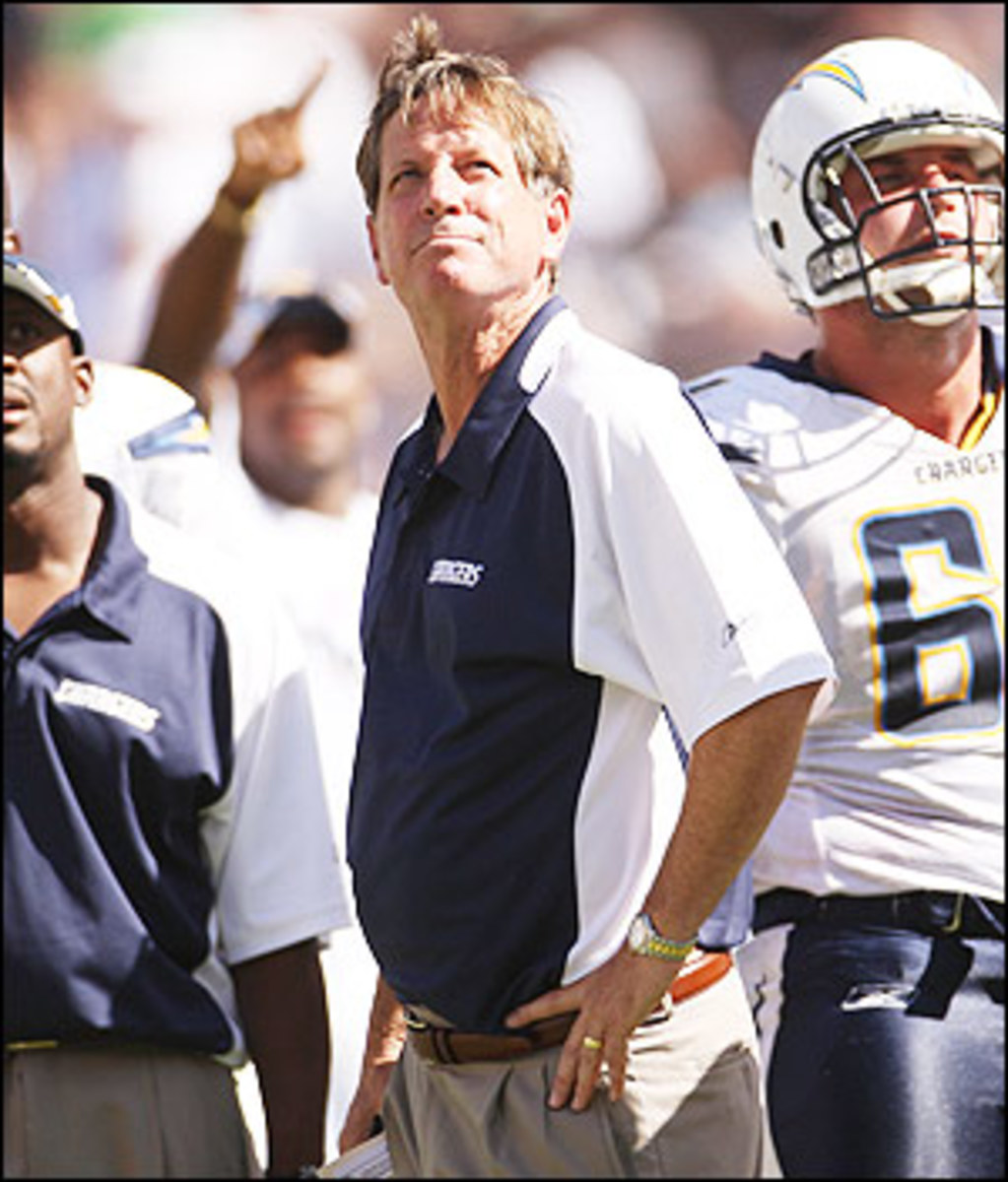Norv's QB quandary
Turner has spent nine months in San Diego and he has already overseen the unraveling of a team that ranked among the best in the NFL, as well as a running back who ranked among the best in NFL history. He has turned a popular Super Bowl pick into a .500 straggler. But considering his past, none of that is very surprising.
The most damning evidence of Turner's tenure is the regression of Philip Rivers. If Turner did nothing else for the Chargers -- if he never even gave a pre-game speech -- he could help Rivers. After all, quarterbacks are his specialty, and Rivers was a promising one. Last season, his first as a starter, he made the Pro Bowl. He was a proud member of the second-tier QBs, the group right below Peyton Manning and Tom Brady.
Today, Rivers finds himself in a totally different class. He ranks 21st in passer rating, behind Joey Harrington. He ranks 21st in completion percentage, behind Brian Griese. He ranks 20th in yards per game, behind Damon Huard. And those other quarterbacks do not enjoy anywhere near the kind of advantages that Rivers does.
He gets to hand off to the most decorated running back in the league, LaDainianTomlinson. He can throw jump balls to the most dynamic tight end, Antonio Gates. His offensive line is decent. His receiving corps is improved. Opposing defenses generally stack the line-of-scrimmage against the Chargers, giving Rivers open space downfield.
Last season, he lived in those open spaces, taking the Chargers to a 14-2 record. This season, under Turner's stewardship, the Chargers are 5-5. They are still in position to make the playoffs and win the division, but only because the AFC West is so lousy.
When Turner is asked what is wrong with Rivers, he cites poor routes, protection problems, questionable decisions and a few bad throws. In Turner's defense, Rivers is tricky to evaluate. It is easy to say that his mechanics are off, but his mechanics have always been unusual. He uses a three-quarter delivery that looks like a shot-put motion.
From the time the Chargers drafted Rivers, fourth overall in 2004, he was not the prototypical quarterback. He lacked arm strength, speed and escape-ability. But he was accurate and he was a winner. If given time and supporting talent, he would not miss.
To see him come unhinged, for no obvious reason, has to remind the Chargers of their last experience in quarterback development. In '02, Drew Brees shone as a first-year starter. In '03, he was benched. He ranked 28th in passer rating, 21st in yards per game and 18th in completion percentage. He looked worse than Rivers does right now.
After the '03 season, the Chargers basically gave up on Brees. By the time he returned to form in '04, it was too late. The Chargers had already drafted Rivers and awarded him a long-term contract. They let Brees leave as a free agent after '05 and watched him become one of the most prolific passers in the league with New Orleans.
"Nothing's happening here that's never happened to anybody before," Rivers said. "It's part of the game. I haven't lost any of my confidence."
Rivers also has not lost his sense of humor. Hanging in his locker is a photograph of himself at North Carolina State, being tackled in his own end zone. Standing over him is a giddy Maryland linebacker named ShawneMerriman. The photograph illustrates how Rivers, even at his lowest point, is still able to endear himself to the rest of the team.
In recent years, the Chargers have been prone to snap decisions. They lost confidence in Brees because of one bad season and they forced out MartySchottenheimer because of one bad game -- albeit an important one, in the playoffs last season against New England. Each of those choices cost Tomlinson another piece of his prime.
Last week, when the Chargers beat the Colts in one of the least convincing victories of all time, the scoreboard at Qualcomm Stadium showed a brief shot of Turner and Rivers chatting on the sideline. Predictably, the crowd booed. But it was hard to determine who the home fans were really booing: Turner or Rivers or both.
The Chargers cannot even think about trying another quarterback. They have too much invested in Rivers. To acquire him, they traded Eli Manning on draft day. To get him on the field, they let go of Brees. In essence, they gave up two starters for one.
They even hired Turner in part for Rivers. Turner had been wildly successful with Troy Aikman in Dallas, Brees in San Diego and Alex Smith in San Francisco. But in all of those stops, he was the offensive coordinator. Once he gets promoted to head coach, and is forced to take time away from the quarterbacks, his greatest strength is neutralized. Now in his third turn as a head coach, Turner's record is 63-87-1.
There is blame to go around in San Diego this season. President Dean Spanos is the one who got rid of Schottenheimer. General manager A.J. Smith is the one who picked Turner. Turner robbed the offense of its identity by marginalizing Tomlinson. Defensive coordinator Ted Cottrell robbed the defense of its identity by limiting linebacker blitzes.
When the Chargers are at their best, their philosophy is relatively simple: pound the ball with Tomlinson, throw play-action passes to Gates, and unleash their vicious group of linebackers on opposing quarterbacks. The problem this season is that they have become less physical on offensive, less aggressive on defense, and too reliant on Rivers.
Someday, Rivers might be able to carry this team on his own. But it is hard to believe Turner will be around to see it.





